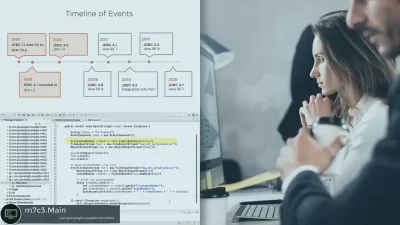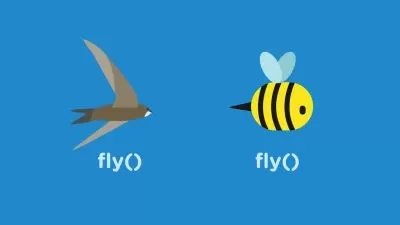Java Best Practices for Efficient, Scalable, and Secure Code
Andrii Piatakha
32:39:29
Description
Tips and Tricks from OOP Foundations to Advanced Architecture Design Concepts - Guide for Developers, Architects, QAs
What You'll Learn?
- Java Best Practices
- Solid Foundation in OOP Principles
- Application of SOLID Principles
- Effective OOP Interview Preparation
- Hands-On Exam on Object-Oriented Programming
- Understanding Java Platform Module System (JPMS)
- Comprehensive Testing Techniques for Java Platform
- Adoption of TDD, BDD & ATDD Methodologies
- Object-Oriented Architecture Design
- The Best Clean Code Practices
- Application of GoF Design Patterns
- Preparation for Design Patterns Interviews
- Stay Updated with Java New Versions
- Effective Logging Practices in Java
- Java Secure Coding Practices
- Designing RESTful Architectures
- Understanding Software Development Metrics and KPIs
- Web Application Design Patterns
Who is this for?
What You Need to Know?
More details
DescriptionUnlock the full potential of Java development with my comprehensive course on best practices. Whether you're a Java developer looking to elevate your coding skills, a Development Lead, an Architect, or a QA professional aiming to enhance testing efficiency. This course is your gateway to a higher level of Java expertise. It provides a deep dive into industry-proven techniques.
Key Learning Points:
Solid Foundation in OOP Principles:
Master the fundamental concepts of OOP and discover their direct applications in Java development.
Application of SOLID Principles:
Learn how to apply SOLID principles systematically, ensuring the creation of Java code that is robust, scalable, and easily maintainable.
Object-Oriented Architecture Design:
Develop the skills needed to create scalable and maintainable Object-Oriented Architecture for Java applications, ensuring your projects stand the test of time.
Application of GoF Design Patterns:
Understand and implement the renowned Gang of Four (GoF) design patterns, addressing common challenges encountered in software design.
Preparation for Design Patterns Interviews:
Learn how to navigate design pattern-related problems commonly encountered in interviews, enhancing your problem-solving skills and interview performance.
Effective OOP Interview Preparation:
Equip yourself with the knowledge and skills needed to confidently navigate OOP-related interview questions, enhancing your prospects in job interviews.
Hands-On Exam on Object-Oriented Programming:
Demonstrate your practical proficiency in applying OOP principles through a comprehensive examination, solidifying your understanding of key concepts.
Understanding Java Platform Module System (JPMS):
Explore the benefits of modularity in Java applications using the Java Platform Module System, gaining insights into creating modular and efficient codebases.
Comprehensive Testing Techniques:
Master Unit Testing with JUnit, delve into Integration Testing, and learn to harness the power of Mockito and PowerMockito for effective and reliable testing.
Adoption of TDD, BDD & ATDD Methodologies:
Gain practical experience in Test-Driven Development (TDD), Behavior-Driven Development (BDD), and Acceptance Test-Driven Development (ATDD), transforming your approach to software development.
Web Application Architecture:Â
We are going to learn the best practices of web application development
Best Practices of RESTÂ Architecture Design in Java Applications:
Architecture - that is something what is critically important from the very beginning.
Stay Updated with Java New Versions:
Keep pace with the latest features and improvements in recent Java versions, ensuring you leverage the full potential of the language.
Effective Logging Practices in Java:
Understand the critical role of logging in Java applications and learn best practices using frameworks like SLF4J and Logback.
Secure Coding Practices:
Explore secure coding practices, addressing OWASP Top 10 security issues in Java applications, fortifying your code against potential vulnerabilities.
Designing RESTful Architectures:
Master the principles of RESTful architecture and learn best practices for designing RESTful APIs in Java, ensuring efficient communication in modern software systems.
Understanding Software Development Metrics and KPIs:
Gain insights into the importance of metrics and key performance indicators (KPIs) in software development. This knowledge enables informed decision-making and continuous improvement in your development processes.
Embark on this educational journey to become a proficient and well-rounded Java developer, QA professional, architect, or tech lead, armed with the latest industry best practices and techniques. Join us on a journey to master Java best practices and elevate your software development skills to new heights.
Who this course is for:
- Java Developers: Intermediate and experienced Java developers looking to enhance their skills and adopt industry best practices in Java programming.
- Java Enthusiasts and Students: Students and enthusiasts who want to build a strong foundation in Java programming and gain insights into industry-standard practices.
- Technical Leads and Architects: Technical leads and architects aiming to reinforce their understanding of Java best practices for designing scalable and maintainable software architectures.
- QA Engineers: QA professionals aiming to understand Java best practices to enhance the quality and efficiency of their testing efforts.
- QA Automation Engineers: Individuals involved in QA automation who want to improve their Java programming skills and incorporate best practices into their automated testing frameworks.
- QA Leads and Managers: QA leads and managers seeking insights into Java best practices to guide their teams in implementing effective and maintainable testing strategies.
Unlock the full potential of Java development with my comprehensive course on best practices. Whether you're a Java developer looking to elevate your coding skills, a Development Lead, an Architect, or a QA professional aiming to enhance testing efficiency. This course is your gateway to a higher level of Java expertise. It provides a deep dive into industry-proven techniques.
Key Learning Points:
Solid Foundation in OOP Principles:
Master the fundamental concepts of OOP and discover their direct applications in Java development.
Application of SOLID Principles:
Learn how to apply SOLID principles systematically, ensuring the creation of Java code that is robust, scalable, and easily maintainable.
Object-Oriented Architecture Design:
Develop the skills needed to create scalable and maintainable Object-Oriented Architecture for Java applications, ensuring your projects stand the test of time.
Application of GoF Design Patterns:
Understand and implement the renowned Gang of Four (GoF) design patterns, addressing common challenges encountered in software design.
Preparation for Design Patterns Interviews:
Learn how to navigate design pattern-related problems commonly encountered in interviews, enhancing your problem-solving skills and interview performance.
Effective OOP Interview Preparation:
Equip yourself with the knowledge and skills needed to confidently navigate OOP-related interview questions, enhancing your prospects in job interviews.
Hands-On Exam on Object-Oriented Programming:
Demonstrate your practical proficiency in applying OOP principles through a comprehensive examination, solidifying your understanding of key concepts.
Understanding Java Platform Module System (JPMS):
Explore the benefits of modularity in Java applications using the Java Platform Module System, gaining insights into creating modular and efficient codebases.
Comprehensive Testing Techniques:
Master Unit Testing with JUnit, delve into Integration Testing, and learn to harness the power of Mockito and PowerMockito for effective and reliable testing.
Adoption of TDD, BDD & ATDD Methodologies:
Gain practical experience in Test-Driven Development (TDD), Behavior-Driven Development (BDD), and Acceptance Test-Driven Development (ATDD), transforming your approach to software development.
Web Application Architecture:Â
We are going to learn the best practices of web application development
Best Practices of RESTÂ Architecture Design in Java Applications:
Architecture - that is something what is critically important from the very beginning.
Stay Updated with Java New Versions:
Keep pace with the latest features and improvements in recent Java versions, ensuring you leverage the full potential of the language.
Effective Logging Practices in Java:
Understand the critical role of logging in Java applications and learn best practices using frameworks like SLF4J and Logback.
Secure Coding Practices:
Explore secure coding practices, addressing OWASP Top 10 security issues in Java applications, fortifying your code against potential vulnerabilities.
Designing RESTful Architectures:
Master the principles of RESTful architecture and learn best practices for designing RESTful APIs in Java, ensuring efficient communication in modern software systems.
Understanding Software Development Metrics and KPIs:
Gain insights into the importance of metrics and key performance indicators (KPIs) in software development. This knowledge enables informed decision-making and continuous improvement in your development processes.
Embark on this educational journey to become a proficient and well-rounded Java developer, QA professional, architect, or tech lead, armed with the latest industry best practices and techniques. Join us on a journey to master Java best practices and elevate your software development skills to new heights.
Who this course is for:
- Java Developers: Intermediate and experienced Java developers looking to enhance their skills and adopt industry best practices in Java programming.
- Java Enthusiasts and Students: Students and enthusiasts who want to build a strong foundation in Java programming and gain insights into industry-standard practices.
- Technical Leads and Architects: Technical leads and architects aiming to reinforce their understanding of Java best practices for designing scalable and maintainable software architectures.
- QA Engineers: QA professionals aiming to understand Java best practices to enhance the quality and efficiency of their testing efforts.
- QA Automation Engineers: Individuals involved in QA automation who want to improve their Java programming skills and incorporate best practices into their automated testing frameworks.
- QA Leads and Managers: QA leads and managers seeking insights into Java best practices to guide their teams in implementing effective and maintainable testing strategies.
User Reviews
Rating
Andrii Piatakha
Instructor's Courses
Udemy
View courses Udemy- language english
- Training sessions 102
- duration 32:39:29
- Release Date 2024/05/18











